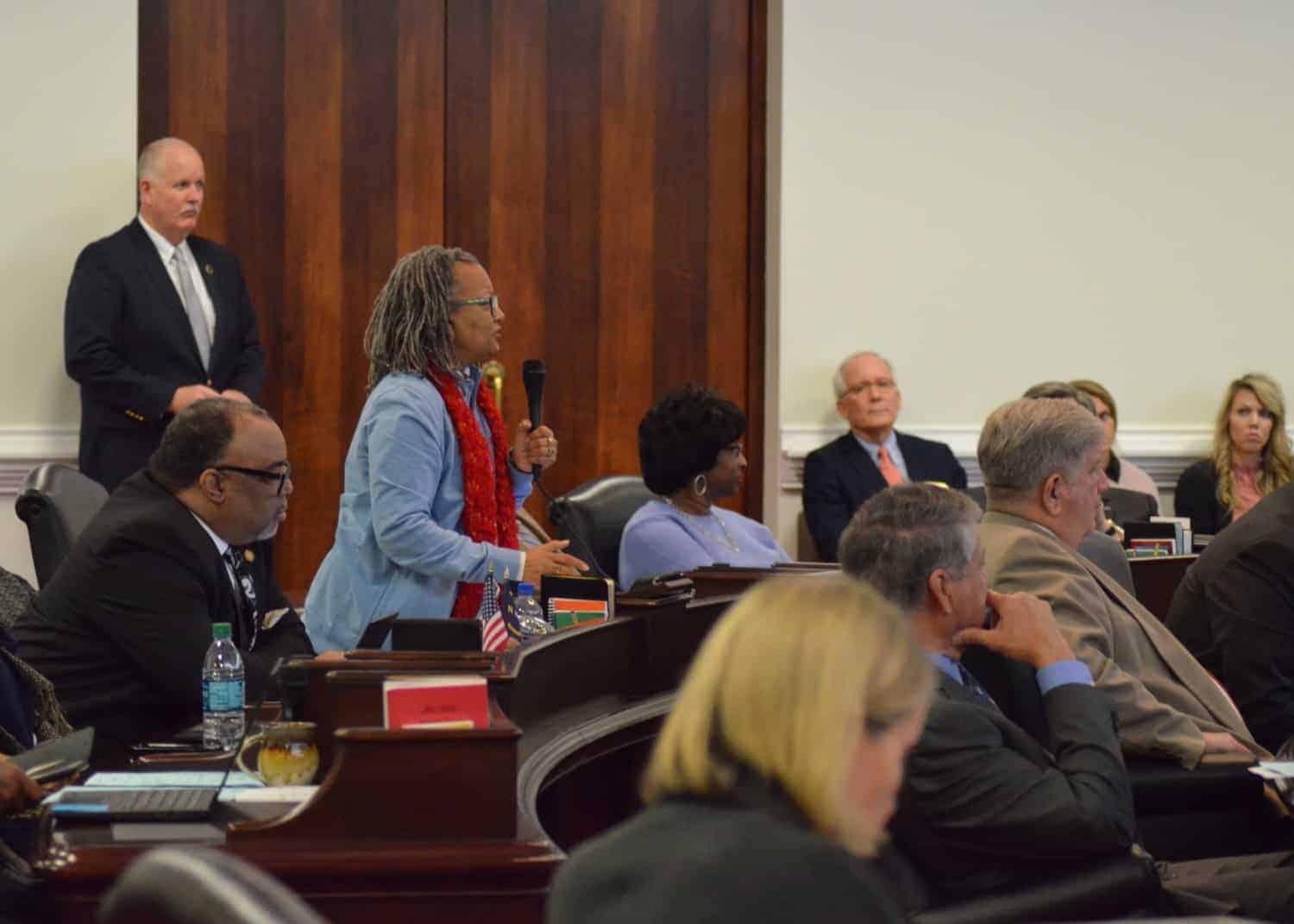A Republican proposal to fix the class-size mandates that have put some districts on edge passed the full Senate 37-5 this morning, but not without some strife. Five democrats voted against it.
The plan phases in implementation of lower class sizes in grades K-3 while providing additional funding for enhancement teachers (art, physical education, music), but attached to the legislation were provisions that would take away Governor Roy Cooper’s ability to distribute funds related to the Atlantic Coast Pipeline as he sees fit and a restructure of the Board of Elections and Ethics Enforcement. Jay J. Chaudhuri, D-Wake, said on the floor that he would vote against the bill because of the extra provisions.
“This bill reflects the fact that the Senate has played politics with our children and our children’s future,” he said.
The class size issue dates back to 2016 when the General Assembly mandated class size restrictions in grades K-3. Districts around the state were upset, saying the change meant they would have to eliminate extracurricular teachers in subjects like music, art, and physical education, and they would need extra space and classrooms to meet the mandate. Districts do not receive much in the way of state money for facilities, so they would be left paying for any additional buildings or classrooms themselves. In 2017, the House tried to reduce the restrictions with House Bill 13, but the Senate transformed the bill and the version that passed only delayed the most stringent restrictions for a year.
The education portion of the proposed legislation passed in the Senate today would phase in the class-size requirements over the next four years and spend about $60 million in additional funds for enhancement teachers next year. Henceforth, enhancement teachers will be funded by a separate allotment from classroom teachers. Previously, funds for the two were combined in one allotment. The amount of money for enhancement teachers would increase each year depending on the needs of districts. School districts would also continue to get about $70 million each year for hiring K-3 teachers to meet class size mandates.
In total, under the plan, school districts would get $250 million in additional recurring funds by the 2021-22 school year.
The phase-in would happen gradually over the next four years, with nothing happening next year and then gradual reductions in class size until the 2021-22 school year.


Lawmakers also added into the bill more money for NC Pre-K, which will eliminate the waiting list for the program by the 2020-21 school year.
The provision related to the Atlantic Coast Pipeline concerns almost $60 million of funds that the bill will divide among school districts in eight counties which the pipeline will travel through. It takes away the Governor’s discretion with regards to the funds. The Governor’s office had said it would use the money on economic development in the eight counties, renewable energy advancement, and to address environmental damage related to the pipeline.
The provision regarding the Board of Elections would add a ninth seat to the Board of Elections and Ethics Enforcement, which is divided four to four between both parties. The ninth seat would be unaffiliated.
Sen. Terry Van Duyn, D-Buncome, was angry that the extra provisions had been added into the bill.
“(The bill) has been pushed through this chamber and is likely unconstitutional and will be struck down in court,” she said.
However, before that, she said she would support the bill.
“I will vote for this because the Republicans finally listened to those North Carolina families that value public schools,” she said.
Chaudhuri, however, was adamant that he would not vote for the bill. He said the Senate had ample time to address the class size issue but chose not to.
“This body set fire to our public education system, and now we’re the so-called firefighters,” he said, adding later. “I’m not voting for this bill because our support for the public education system should, frankly, be singular.”
Sen. Erica D. Smith, D-Northampton, said on the floor that she was undecided on how to vote on the bill, but she said lumping class size in with these other two provisions was wrong.
“When you put these provisions in this bill in the manner in which it is, you make it unfair,” she said.
She ultimately voted for the bill. In explaining her decision after the vote, she said it came down to her constituents. Northampton, one of the counties Smith represents, is one of the eight counties that will receive the Atlantic Coast Pipeline money.
“How could I tell my county and seven others I don’t support Tier 1 school systems receiving a portion of $58 million?” she said. Tier 1 counties are the most economically distressed in the state. “How can I tell LEAs (Local Education Agencies) across the state there is no relief for class size restriction and the opportunity for increased funding for early childhood education?”
Sen. Angela R. Bryant, D-Nash, questioned Republicans about the process by which this bill came before the General Assembly. She asked whether Democrats were part of a committee where the provisions of the bill and the information received from districts regarding number of enhancement teachers were discussed. Part of the revised House Bill 13 was a provision that districts had to provide numbers to the General Assembly on various pieces of information, including the number of enhancement teachers in each district. Lawmakers argued that they were waiting for that information before implementing a class-size fix.
Sen. Chad Barefoot, R-Wake, told Bryant the bill was discussed in the joint appropriations committee Wednesday, which includes Democrats. He also said that the numbers received by the General Assembly by districts were open to all legislators.
“I would assume that if you guys were working on a solution…you would have been familiar with those numbers all the way along,” he said.
“I am clear that this was not discussed in an education committee with bipartisan members on it?” Bryant responded.
“It was discussed in a bicameral committee with bipartisan members involved,” Barefoot said.
When Bryant actually started debating the bill, she reiterated Democrats’ complaints that the class-size provision should not have been lumped in with other provisions.
“It is concerning to me that there are provisions of this bill that don’t have to do with education that would have been better vetted and discussed without a kangaroo court,” she said.
Republicans rallied around the bill, saying it was good for education. Sen. Tamara Barringer, R-Wake, called out the Pre-K provision of the bill in particular.
“Three-thousand children who have not had the opportunity to experience pre-kindergarten will now do so,” she said.
And Sen. Tommy Tucker, R-Union, addressed Chaudhuri’s comments, saying that Senate Republicans acted appropriately by waiting until they had more information before acting fully on class size.
“Instead of throwing money at the problem in HB 13, we waited until the LEAs gave us the numbers,” he said.
Sen. Ralph Hise, R-Mitchell, said that far from shortchanging debate on the class-size bill, Republicans have gone above and beyond. He said that since the bill is actually a conference report, the Senate could have just brought it straight to the full Senate floor and skipped the joint appropriations committee Wednesday.
“Did we not take an extraordinary step yesterday for the purpose of debate to call a joint committee that is not required under our rules?” he asked.
Sen. Mike Woodard, D-Durham, asked Smith if she would consider the joint appropriations committee meeting Wednesday a debate.
“I did not consider it a debate in any aspect of the word,” she said.
Woodard went on and asked how she would describe the committee meeting.
“For those who do not understand what Kafkaesque is, I would say it was an ambush,” she said.
The five Democrats who voted against the bill were Chaudhuri, Woodard, Bryant, Van Duyn, and Sen. Valerie P. Foushee, D-Orange.
The House is expected to vote Tuesday.



